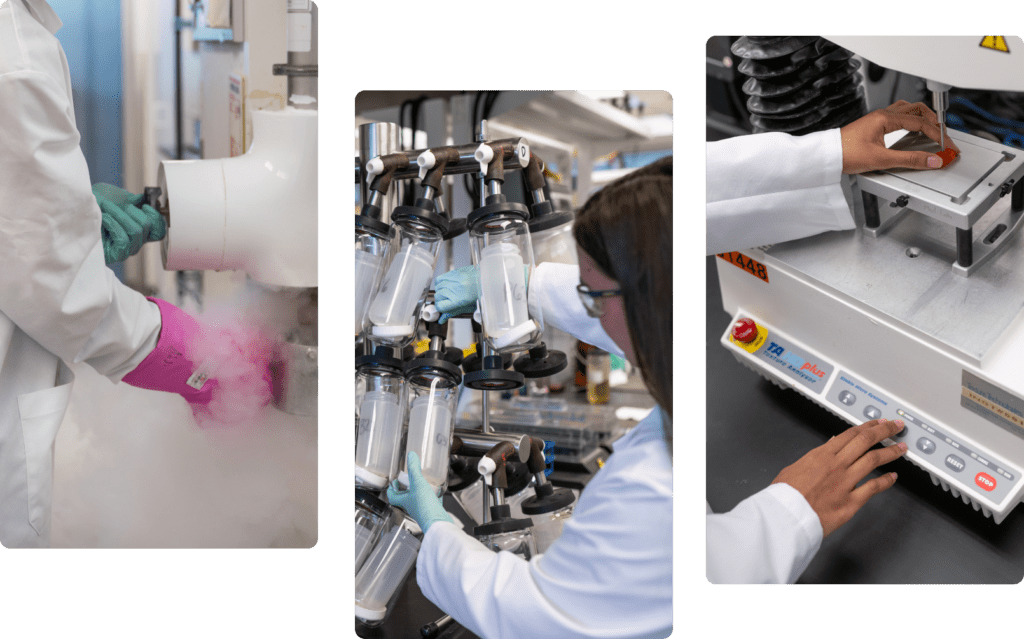Fiber (Insoluble, Soluble, Total - Resistant Oligosaccharides Method) Test
-
Price
$560 per analysis
-
Turnaround time
7 - 9 Business Days
-
Rush
Available


Technical data sheet
Method description
This method determines traditional total dietary fiber (TDF), soluble dietary fiber (SDF), insoluble dietary fiber (IDF), and digestion-resistant oligosaccharides (ROs) in both food ingredients and food products. Samples (defatted if necessary) are first run by a traditional dietary fiber method, in which digestion with three enzymes (protease, amylase, and amyloglucosidase) is carried out in a phosphate buffer. Any solid particles not in solution after digestion are considered insoluble dietary fiber and are filtered off and measured gravimetrically. The filtrate from this first filtration is collected and ethanol is added to precipitate the soluble dietary fiber. The soluble fraction is then filtered and measured gravimetrically. The final filtrate solution from the soluble dietary fiber analysis is collected after filtering off the precipitated soluble fiber fraction. Resistant oligosaccharides are soluble in this alcoholic solution, so in order to quantitate them, the filtrate is evaporated to 20 mL. Deionized through a series of anion and cation exchange columns to remove interferences from buffers, salts, amino acids, peptides, and protein and then reconcentrated to 10 mL. The solution is mixed well and syringe filtered prior to analysis by size exclusion HPLC. The size exclusion HPLC columns separate sample solution components into peaks based on molecular weight. The peaks corresponding to oligosaccharides larger than DP2 are quantitated, summed, and reported as total resistant oligosaccharides.
Acceptable matrices
Food and Food Ingredients
Unacceptable matrices
Baking powder, Samples containing more than 2% stevia
Limit of quantitation
Total Dietary Fiber - 0.2% Soluble Fiber – 0.2% Insoluble Fiber – 0.1% Resistant Oligosaccharides - 0.1%
Equipment
General Gravimetric Analytical Chemistry Equipment HPLC-Refractive Index Detector
Method reference
AOAC 2001.03 with AOAC 991.43 digestion
Reportable unit
%
Sample size requirements
25 g
Information required by submitter
please supply expected estimates. Indicate matrix type, and indicate if samples are high in fat (>5% fat). Indicate whether the sample contains stevia, fructans (inulin or fructooligosaccharides (FOS)), psyllium, flax, and gum (i.e. guar gum)
Additional information
This test is ISO/IEC 17025 accredited through A2LA, Certificate # 2769.01. Dietary Fiber is the portion of the carbohydrates which is not digested in the human gut. It is composed of both soluble and insoluble components. These methods are applicable to all food products, however samples containing psyllium or fructans should be submitted under specific test codes. High-fat (>5%) samples require special handling. Resistant oligosaccharides are polysaccharides from DP3 and higher which are soluble in ethanol and are resistant to digestion by amylase under the conditions of the traditional dietary fiber analysis (AOAC 991.43). In the past, this analysis has gone by names such as “fibersol” and “resistant maltodextrins.” At Medallion Labs, we feel that these terms are limiting because we know that other polysaccharides, such as polyfructans are also included in this result. We are using AOAC method 2001.03, but have renamed the result “resistant oligosaccharides” because we feel this is the proper, general classification for the molecules that are being measured.
Is this the most suitable fiber test for evaluating my product?
Find your fiber source(s) on the chart and use the alpha reference to see how it aligns with each method. If the alpha reference is fully inside the method circle, that method is optimal for your fiber source(s). If it's outside or touching the circle's edge, the method won't fully capture the fiber. Remember to check applicable labeling regulations for allowed fiber sources.
- AOAC Method 2001.03
AOAC Method 991.43 - AOAC Method 2017.16
AOAC Method 2022.01 - AOAC Method 985.29
AOAC Method 991.43 - AOAC Method 2009.01
AOAC Method 2011.25
-
Cellulose | Beta-Glucan | Psyllium | Gums | Lignin
-
Galacto-oligosaccharides-Raffinose(GOS)/Stachyose
-
Galactomannan | Arabinoxylan | Glucomannan
-
Resistant Starch RS4
-
Resistant Starch RS2 & RS3
-
Pectin | Alginates | Arabinogalactin | Isomalto-oligosaccharide (IMO)
-
Polydextrose | Fibersol®-2 | Resistant Maltodextrins | Soluble Corn Fiber (SCF)
-
Fructans (Inulin, FOS)
-
Cellulose | Beta-Glucan | Psyllium | Gums | Lignin
-
Galacto-oligosaccharides-Raffinose(GOS)/Stachyose
-
Galactomannan | Arabinoxylan | Glucomannan
-
Resistant Starch RS4
-
Resistant Starch RS2 & RS3
-
Pectin | Alginates | Arabinogalactin | Isomalto-oligosaccharide (IMO)
-
Polydextrose | Fibersol®-2 | Resistant Maltodextrins | Soluble Corn Fiber (SCF)
-
Fructans (Inulin, FOS)
-
Cellulose | Beta-Glucan | Psyllium | Gums | Lignin
-
Galacto-oligosaccharides-Raffinose(GOS)/Stachyose
-
Galactomannan | Arabinoxylan | Glucomannan
-
Resistant Starch RS4
-
Resistant Starch RS2 & RS3
-
Pectin | Alginates | Arabinogalactin | Isomalto-oligosaccharide (IMO)
-
Polydextrose | Fibersol®-2 | Resistant Maltodextrins | Soluble Corn Fiber (SCF)
-
Fructans (Inulin, FOS)
-
Cellulose | Beta-Glucan | Psyllium | Gums | Lignin
-
Galacto-oligosaccharides-Raffinose(GOS)/Stachyose
-
Galactomannan | Arabinoxylan | Glucomannan
-
Resistant Starch RS4
-
Resistant Starch RS2 & RS3
-
Pectin | Alginates | Arabinogalactin | Isomalto-oligosaccharide (IMO)
-
Polydextrose | Fibersol®-2 | Resistant Maltodextrins | Soluble Corn Fiber (SCF)
-
Fructans (Inulin, FOS)
Common Fiber (Insoluble, Soluble, Total - Resistant Oligosaccharides Method) Test Testing Questions
While our sales and customer service team are happy to answer general testing questions, consultations typically start at a rate of $250 per 30 minutes regarding the interpretation of reported test results or questions about our test methods. We cannot consult on regulations, tolerance limits, or claims.
We make every effort to keep our methods and detection limits up to date according to the latest standards and qualifications. If you have any questions regarding the limit of detection/quantification or method references, please contact our Customer Service team at 1-800-245-5615.
Our standard turnaround time is 10 business days for most assays. There are some assays that require a longer turnaround time. We also offer a RUSH service that is half the time of the standard turnaround time of the assay at double the cost of the assay. A few assays that we provide cannot be rushed due to the nature of the test. Please check the specific assay you are interested in regarding the ability to RUSH the turnaround time.
Medallion Labs, a division of General Mills, offers multiple areas of expertise for analytical testing and product evaluation for the food and ingredient industry. Our areas of expertise include Chemical Analysis, Nutritional Analysis, Food Safety, Shelf Life Studies, Microbiology, Specialty Fibers, Physical Testing, Allergen Testing, as well as Product Evaluation (which includes Product Performance and Sensory Evaluation) and Technical Consulting/Method Development. Our methods are developed for the testing of food products and ingredients.
Do you have a more specific question?
Our food testing experts are here to help.
"*" indicates required fields

Helpful content related to Fiber (Insoluble, Soluble, Total - Resistant Oligosaccharides Method) Test
Let’s Get to Work!
Submit your order online and ship your samples today. If you have questions, we are always here to help.
Medallion Labs
A food testing program designed with mid-market and enterprise food and ingredient manufacturers in mind.
